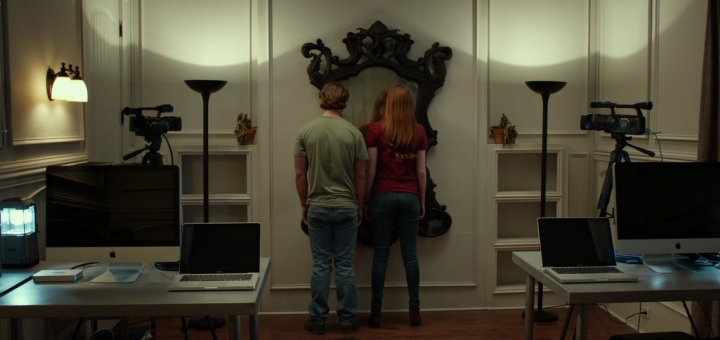
In 2006 Mike Flanagan co-wrote and directed Oculus: Chapter 3 – The Man with the Plan, a short in which a man constructed an experiment to prove that an antique mirror was haunted. The short was fairly successful on the festival circuit and rights to the story were quickly picked up by a major studio. In 2012, with an expanded script and a bigger budget, Flanagan shot Oculus, which premiered in 2013, and eventually received wide release in the US earlier this year. The film garnered considerable praise from most major horror blogs and critics who saw it as a refreshing entry into a tired genre – as far as mirror-based horror goes, this is far better than Alexandre Aja’s Mirrors and, overall, Oculus is a contemporary mainstream horror film that, quite surprisingly, actually lives up to the considerable hype that has followed it.
The film follows Kaylie (played by Karen Gillan, and as a child by Annalise Basso) and Tim (Brenton Thwaites/Garrett Ryan) Russell, two siblings whose parents were murdered by supernatural forces years before. Tim was convicted of the murders as a child and has just been released from a mental institution and is no longer convinced of the supernatural nature of the family’s mirror, however Kaylie is determined to retroactively exonerate him of the murders by proving that the mirror is, in fact, haunted. From here there’s a nice but ineffective juxtaposition of the sane and insane, attempting to drive the audience to question if it is Tim or Kaylie that is actually insane, and temporalities begin to overlap as the past blends with the present and events begin to repeat themselves.
This is a pretty original concept, especially for a mainstream release and it was a pleasant surprise given that the trailers and promotional material do not even remotely hint the film will go down this path. The blending of dual temporalities highly effective – none of the flashbacks are jarring and they never kill the pacing. The first third even has as good run at building an extensive and entertaining mythology. The remarkably stable camerawork utilized throughout is extremely refreshing and quite welcome in a market with a glut of handheld-shot, found footage centred features.
For mainstream horror fare this is actually pretty frightening; each character’s actions are unpredictable and keep you guessing. The way that Flanagan invokes terror in the audience is masterful, and watching our leads railroad themselves into disaster was perfectly frustrating – both infuriating and extremely enjoyable. We’re even given some really messed up but simple practical effects sequences, including a super cringe-inducing shot involving a finger and a staple remover. Surprisingly, the film manages to have you questioning reality in its later parts. It’s rare that a film manages to actually have you questioning your own sanity as temporalities overlap and characters’ sanity disintegrates.
If I could complain about something, I wish a little more emphasis was placed on the possible delusion of Kaylie; we’re too ready to accept the existence of the supernatural as we see it in action during the opening sequence. By delaying this revelation, the tension between sanity and insanity could have been exploited more proficiently and the first third would have been much tenser. This is a minor gripe though, as Mike Flanagan is still effective in creating tense, claustrophobic scenes throughout the feature that occasionally shocked me and regularly made my skin crawl, although it’s worth noting that the film has no sticking power – it is no longer frightening after the end credits roll, a bit of a disappointment considering its strength during the actual runtime (that’s not to say that the absence of a post-conclusion scare wasn’t pleasant).
I’m really surprised that the distributor held back the release of Oculus in Australia. If 15 year old me, the boy who’d go and see any and all mainstream horror flicks in the theatre regardless of critical reception saw this, they would have been blown away and probably quite terrified. I’ve been searching for a bit of greater meaning in the film and I think that Flanagan may be commenting on the way in which mirrors inflict psychological terror upon their users (by enabling and reinforcing body image disorders), symbolised by the physical and mental delusions the haunted mirror instils in its owners – although maybe I’m reading too far into this. Regardless, Oculus is a bold debut from Flanagan, and well deserving of a chunk of your attention – given its international success I’m sure a sequel will be in the works (if it isn’t already); hopefully it isn’t its Insidious: Chapter II to Oculus’s Insidious.
